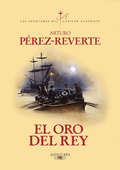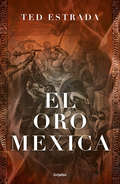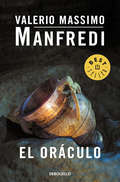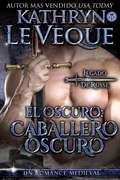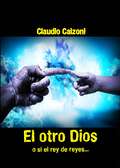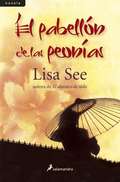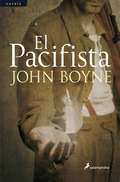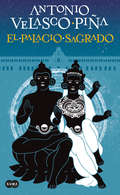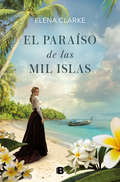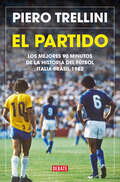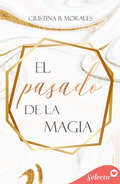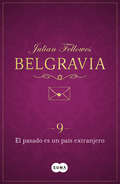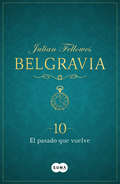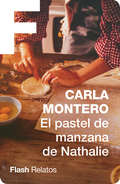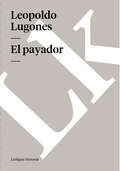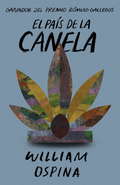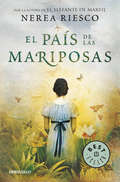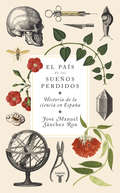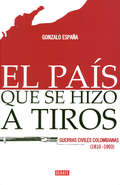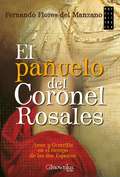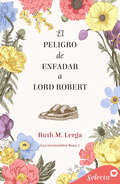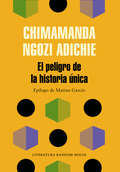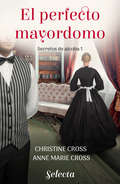- Table View
- List View
El oro del rey (Las aventuras del capitán Alatriste #Volumen 4)
by Arturo Pérez-ReverteEn esta cuarta entrega de «Las aventuras del capitán Alatriste», que acontece en Sevilla en 1626, el capitán recibe tras su regreso de Flandes el encargo de reclutar a un pintoresco grupo de bravos espadachines para una peligrosa misión. Sevilla, 1626. A su regreso de Flandes, donde han participado en el asedio y rendición de Breda, el capitán Alatriste y el joven mochilero Íñigo Balboa reciben el encargo de reclutar a un pintoresco grupo de bravos espadachines para una peligrosa misión, relacionada con el contrabando del oro que los galeones españoles traen de las Indias. Los bajos fondos de la turbulenta ciudad andaluza, el corral de los Naranjos, la cárcel real, las tabernas de Triana, los arenales del Guadalquivir, son los escenarios de esta nueva aventura, donde los protagonistas reencontrarán traiciones, lances y estocadas, en compañía de viejos amigos y de viejos enemigos. La crítica ha dicho:«Esta novela, fabulosa y embaucadora de principio a fin, llena de hondura y de realismo, es un retablo social, una crónica cultural y un personaje cuya grandeza crece al ritmo de sus hazañas».El Cultural «Se precisa ser muy maestro y haber trabajado mucho cada página para dar vida a los viejos aires de la picaresca y poderlo hacer sin que la narración de aventura se incomode o resienta... El oro del rey es fruto de una documentación copiosísima de argot, de nombres de utensilios, de léxico sobre vestimenta, sobre el barco, sobre jergas de taberna y de cada oficio de los convocados,... que ha dado en esta novela páginas magistrales... Pérez-Reverte es capaz de dotar a cada capítulo de autonomía propia, y cada uno resulta antológico de una atmósfera, dominando los diferentes registros ligados a espacios urbanos y/o sociales».José María Pozuelo Yvancos, Abc Cultural
El oro mexica
by Ted Estrada«El oro mexica pinta con brochazos gruesos y realistas el funesto encuentro de dos culturas en el Nuevo Mundo: una dispuesta a dar todo por defenderse, y la otra empeñada en destruir a su oponente.» -Beatriz Braniff Cornejo Perdido el imperio mexica, tras ser derrotados sus guerreros, destruidos sus templos y encarcelados sus sacerdotes, Hernán Cortés se convierte en el gobernador de la Nueva España por órdenes del rey Carlos I. Pero el cargo conlleva una responsabilidad ineludible: enviar de vuelta a España todo el oro que encuentre en el nuevo mundo, para financiar los ejércitos que protegerán de sus enemigos al debilitado imperio. Cortés, incapaz de hallar suficiente oro para complacer a su rey, recuerda que en el palacio de Moctezuma vio, durante las primeras visitas diplomáticas que antecedieron a las hostilidades, enormes salones repletos del preciado metal, que parece haberse esfumado en el aire. ¿Dónde está el tesoro secreto de los mexicas? ¿Hasta dónde llegará el conquistador para conseguirlo?
El oráculo
by Valerio Massimo ManfrediUn apasionante misterio histórico. Grecia, 1973. Son los últimos días del régimen de los coroneles y los disturbios estudiantiles. En una excavación arqueológica, el profesor Periklis Harvatis encuentra un magnífico vaso de oro en el que están grabadas las enigmáticas imágenes del último viaje de Ulises: la profecía perdida de Tiresias. Pero el profesor también realiza un segundo hallazgo que provoca su muerte. A los diez años se suceden varios crímenes relacionados con la violación y el asesinato de una bella estudiante en la misma noche en que Harvatis murió misteriosamente. Parecen actos de venganza de víctimas de la represión policial de la década anterior, pero hay algo aún más misterioso: parecen guiados por la mano de un personaje asombroso, heroico, mítico. Las autoridades están desconcertadas: ¿quién se esconde tras estos hechos? ¿Qué relación hay entre ellos? ¿Qué secreto esconde el antiguo vaso de Tiresias? Reseña:«Cuatrocientas páginas que rezuman saber, citas de Homero y referencias mitológicas, pero que tienen también el sabor de quien está familiarizado con la aventura, de quien sabe qué significa escarbar con los dedos en la tierra helada en busca de algo que sale a la luz tras milenios de silencio.»Panorama
El oscuro: Caballero Oscuro
by Kathryn Le Veque1486 A.D. - Recién salido de su traicionero cambio de rumbo contra Richard III en la Batalla de Bosworth, la reputación de Sir Gaston de Russe es oscura y sucia. Los leales a Richard lo odian y los leales a Henry Tudor le temen. Él es, después de todo, El Oscuro. Con el fin de obtener una posición firme en Yorkshire, Henry envía a Gaston a una de las fortalezas más grandes del norte, un bastión gigante llamado Castillo del Monte de Holyoak. Habiendo pertenecido anteriormente a Sir Guy Stoneley, quien ahora está preso en la Torre Blanca después de su captura en Bosworth, el castillo sigue siendo el hogar de la esposa de Guy, Remington, sus tres hermanas y su hijo. Gaston toma posesión del monte. Holyoak, contento con su adquisición e intrigado con Lady Stoneley. Hermoso, algo tímido y recatado, Gaston pronto descubre que Mt. Holyoak alberga un horrible secreto de violación y abuso. Guy Stoneley abusó de su esposa y hermanas, tanto que las mujeres recurren a Gaston como su salvador para tomar el monte Holyoak de Guy. Mientras Gaston se esfuerza por administrar el Norte y formar alianzas con aquellos que aún son leales a Richard, algo más está ocurriendo que amenaza distraerlo de su tarea. El señuelo, el poder, es más de lo que puede resistir. Se está formando un fuerte vínculo entre el caballero que se cree que es el más traidor y la dama que no ha conocido más que tristeza y horror. Y con esa realización, una delicada historia de amor comienza cuando dos personas solitarias encuentran consuelo entre sí. Gaston pronto se da cuenta de que ama a Remington más que nada, lo que prepara el escenario para la batalla más grande de su vida: la lucha contra la Iglesia Católica en su búsqueda de una anulación para poder casarse con ella. Únete a Gaston y Remington mientras se embarcan en una aventura épica de descubrimiento, amor, angustia y dolor, derrota y victoria. Desde las colinas de Yorkshire hasta los pas
El otro Dios: o si el rey de reyes...
by Claudio CalzoniEl otro Dios de Claudio Calzoni o si el rey de reyes... ¿Qué hubiera pasado si la vida del Dios que cambió la historia del hombre hubiera sido diferente? Claudio Calzoni elabora un futuro alternativo, una puerta corrediza, para el Ser Divino que es la base de toda sociedad moderna.
El pabellón de las peonías
by Lisa SeeDespués de cautivar a cientos de miles de lectores con El abanico de seda -la fascinante historia del nushu, el lenguaje secreto de las mujeres-, Lisa See abre una ventana a un mundo asombroso, donde la riqueza de la vida cotidiana se mezcla con el lado más místico de la cultura china. En la China del siglo XVII, los manchúes se han alzado con el poder tras derrocar a la dinastía Ming. Ajena al cataclismo político, la joven Peonía vive con su próspera familia en una hermosa casa junto al Lago del Oeste de Hangzhou. Educada de forma exquisita para convertirse en una esposa dócil y culta, Peonía espera emocionada la celebración de su decimosexto cumpleaños. Numerosos invitados asistirán a la representación de la famosa ópera El pabellón de las peonías en el jardín de su casa y ella conocerá finalmente al joven que sus padres han elegido para desposarla. Sin embargo, la noche de la función, Peonía vislumbra entre los asistentes a un hombre apuesto y elegante, que despertará en ella una oleada de nuevas e irresistibles emociones.
El pacifista
by John BoyneJohn Boyne maneja los hilos del relato con gran destreza, hasta alcanzar un desenlace impactante, de los que permanecen en el recuerdo. Septiembre de 1919. Tristan Sadler, de veintiún años, coge un tren de Londres a Norwich para devolverle a Marian Bancroft las cartas que ésta escribió a su difunto hermano, Will, durante la Gran Guerra. Will y Tristan tuvieron una relación íntima, pero las cartas son sólo el pretexto de la visita. En realidad, Tristan guarda un doloroso secreto en lo más hondo de su ser, un secreto que está dispuesto a compartir con la hermana de su amigo, si finalmente consigue reunir el valor necesario. El pacifista es una novela de heroísmo, amor y traición en el universo moralmente nebuloso de la guerra. En un entorno donde imperan la crueldad y la sinrazón, dos jovencísimos soldados libran una amarga batalla contra la complejidad de sus emociones. Su amistad, primero en el campo de instrucción ydespués en las trincheras del norte de Francia, trae consigo la intensa luz del autoconocimiento y la felicidad, pero también las tinieblas del desconcierto y el dolor. La crítica ha dicho...«Una novela de una profunda melancolía [...]. John Boyne es muy, muy bueno en su retrato del poder destructivo de un secreto dolorosamente guardado.»John Irving «Una novela que se interroga con crudeza no sólo sobre qué significa ser hombre sino qué significa ser una persona en las circunstancias extremas de la guerra.»The Irish Times «Impactante, emotiva y hermosamente escrita. Se convertirá en un clásico de las novelas sobre la guerra.»The Bookseller «La deshonra y la culpa son dos enormes sombras en este libro, en el que Boyne conecta la deshonra sexual con la deshonra moral y la deshonra social.»Irish Independent
El palacio de la luna (Emperatriz Wu #1)
by Weina Dai RandelLa historia de la primera y única mujer emperatriz de China que gobernó en su propio nombre. Para una mujer, el camino hacia el poder nunca es sencillo. <P><P>Año 631, quinto año de la dinastía Tang. Mei vive con su familia cuando su felicidad se ve completamente destruida y ella acaba en las dependencias del palacio imperial formando parte del ejército de concubinas. Ahí aprenderá que en palacio hay muchos caminos para atrapar la atención del emperador. <P>Algunas maquillan sus caras de blanco y se peinan con cuidado, con la esperanza de fascinarle con su belleza. Otras se presentan con fantásticos regalos, como colgantes de jade o rollos de caligrafía. Pero la joven e inteligente Mei será la única que conseguirá impresionar al emperador con las mismas cualidades que hacen de ella un personaje marginado entre las otras concubinas... <P>Y así comienza a destacar la primera y única mujer que llegó a ser emperatriz en la antigua China.
El palacio sagrado
by Antonio Velasco PiñaUna serie de acontecimientos históricos mexicanos son reinterpretados a la luz de tradiciones milenarias. De Antonio Velasco Piña, el escritor más reconocido de la mexicanidad sagrada y autor de Regina. Los milenarios conocimientos del México antiguo en el recinto más representativo de nuestro país. Un relato en el que episodios clave de la historia de México son reinterpretados a la luz de tradiciones sagradas. Antonio Velasco Piña, el aclamado autor de Regina, narra en estas páginas su descubrimiento del Palacio Nacional, uno de los sitios más emblemáticos de nuestro país. En este escenario, el protagonista conoce a la mujer de sus sueños y decide emprender una hazaña extraordinaria para ganarse su amor. Esto lo conduce a un proceso de evolución de la conciencia y reencuentro con la sabiduría milenaria. La narración se entrelaza con la historia del palacio, escenario de algunos de los episodios más trascendentales de la historia de México, recreados en estas páginas: los últimos momentos del mundo prehispánico, la unión de dos culturas durante el virreinato, las caminatas de carácter sagrado que los cadetes del Colegio Militar realizaban durante el siglo XIX, los sangrientos actos de la Decena Trágica, entre otros. Estos hechos son reinterpretados a la luz de tradiciones milenarias, con el sello personal de su autor, el máximo exponente de la mexicanidad sagrada.
El paraíso de las mil islas
by Elena ClarkeUna mujer. Un viaje a un paraíso de playas vírgenes. Una historia de amor prohibida. A veces, los secretos del pasado esconden todas las verdades que necesitamos. Madrid, en la actualidad. Mara siente que algo falta en su vida desde hace tiempo. Dueña de una cadena de muebles coloniales que decoran las casas más exquisitas de la ciudad, el éxito empresarial la acompaña pero en el terreno personal no alcanza la felicidad que tanto desea. Un día, un maravilloso mueble se cruza en su camino y se convierte en su obsesión. Y también en la excusa perfecta para huir a tierras lejanas en busca de sí misma. Será en Bali, ese lugar mágico en el archipiélago de Indonesia, donde entrará en contacto con el pasado colonial de la isla y con la historia de una mujer que vivió en el siglo XIX y que protagonizó una apasionante y peligrosa historia de amor.Al mismo tiempo, Mara descubrirá también dónde se encuentra el verdadero paraíso.
El paraíso de las mil islas
by Elena ClarkeUna mujer. Un viaje a un paraíso de playas vírgenes. Una historia de amor prohibida. A veces, los secretos del pasado esconden todas las verdades que necesitamos. Madrid, en la actualidad. Mara siente que algo falta en su vida desde hace tiempo. Dueña de una cadena de muebles coloniales que decoran las casas más exquisitas de la ciudad, el éxito empresarial la acompaña pero en el terreno personal no alcanza la felicidad que tanto desea. Un día, un maravilloso mueble se cruza en su camino y se convierte en su obsesión. Y también en la excusa perfecta para huir a tierras lejanas en busca de sí misma. Será en Bali, ese lugar mágico en el archipiélago de Indonesia, donde entrará en contacto con el pasado colonial de la isla y con la historia de una mujer que vivió en el siglo XIX y que protagonizó una apasionante y peligrosa historia de amor.Al mismo tiempo, Mara descubrirá también dónde se encuentra el verdadero paraíso.
El partido: Los mejores 90 minutos de la historia del fútbol. Italia-Brasil 1982
by Piero Trellini«Será un partido que recordaremos, del que hablaremos todavía cuando hayan pasado muchos años y sus principales protagonistas sean sólo nombres vinculados a la mitología del fútbol».MARIO VARGAS LLOSA Piero Trellini tenía solo doce años el 5 de julio de 1982, cuando Brasil e Italia se disputaron el pase a la semifinal del mundial de España. El resultado parecía decidido: los brasileños poseían la belleza en la técnica y la ejecución; las apuestas estaban con ellos. Para los italianos, sumidos en un silencio tácito de años y en una guerra con el mundo y consigo mismos, el reto era imposible. Y, sin embargo, tras ese día, el fútbol nunca volvió a ser lo mismo. Ganó un país que no se atrevía a soñar con una victoria. Este libro es el relato de una pasión narrado con la pulcritud de un historiador, la curiosidad de un reportero y la pasión de un aficionado. En él cabe todo, desde los anteriores mundiales hasta las trayectorias políticas de los países implicados, desde las alineaciones hasta el análisis del minuto a minuto. Es una crónica apasionante con un elenco de personajes inolvidables (Rossi, Sócrates, Falcao, Junior, Conti, Tardelli, Zoff) del que quizá fue el mejor partido de fútbol de la historia. Pero no es solo una oda al juego, es también la recreación del ambiente político, social y económico de los años setenta y ochenta, una línea cronológica que trasciende el ensayo deportivo para entender lo que fuimos y nunca volveremos a ser. La crítica ha dicho:«Será un partido que recordaremos, del que hablaremos todavía cuando hayan pasado muchos años y sus principales protagonistas sean solo nombres vinculados a la mitología del fútbol».Mario Vargas Llosa «Nunca había leído, sobre un único partido, una crónica tan completa y atractiva. En su género: una obra maestra».Darwin Pastorin, Huffington Post «Ya no se escriben libros así. Es un superlibro (así como decimos superhéroe), tiene superpoderes, y su mayor superpoder es hacer revivir el partido con un suspense insostenible, como si no supiésemos que Paolo Rossi metió tres goles. Recomiendo El partido a los apasionados del fútbol. Descubrirán muchísimas cosas. De la vida y no del fútbol».Antonio D’Orrico, Sette, Corriere della Sera
El pasado de la magia
by Cristina B. MoralesCruel, caprichoso, volátil, el destino separa a amantes y rompe corazones. Pero hay lazos que es imposible destruir. Combarro, 1840. Siguiendo una antigua costumbre, Mercedes Videla abandona su hogar para vivir durante un año en el seno de otra familia de brujas. Los padres de Mercedes esperan que de esta convivencia surja un matrimonio ventajoso y, mientras tanto, que la muchacha conozca otras formas de seguir el culto de Gaia y continúe su educación. Mientras trata de hacerse a unas costumbres desconocidas para ella, rodeada de la familia Domuiño y en un idioma que no domina, Mercedes tendrá que demostrar su valía... y lidiar con Lúa, la impertinente doncella de la familia, que no hace más que sacarla de quicio. Aunque sus sonrisas la confundan. Aunque cada momento que pasa con ella su corazón palpite desbocado. Porque quizás no sea irritación lo que sienta por ella, después de todo. Pero cuando la felicidad parece estar al alcance de su mano Mercedes recibe una inesperada carta de sus padres. En Zaragoza, uno de los herederos de la poderosa familia Alcalá se ha fijado en ella y la ha pedido en matrimonio. Los padres de Mercedes esperan que acepte: su honor depende de ello. Pero Mercedes no quiere renunciar al amor para llevar un vida miserable al lado de un hombre al que no desea... Un amor silenciado en el tiempo. Una pasión olvidada, una historia abandonada por los años. Hasta ahora.
El pasado es un país extranjero (Belgravia #9)
by Julian FellowesBelgravia, del creador de Downton Abbey, Julian Fellowes, es una historia publicada en 11 capítulos en la mejor tradición de las novelas por entregas. En esta novena entrega, el descubrimiento de ciertos documentos amenaza el futuro de más de una familia. Muy cerca de Buckingham Palace, tras las puertas de las grandes mansiones del Londres victoriano reinan el escándalo y la intriga. Bienvenidos a Belgravia. Ambientada a mediados del siglo XIX, en una sociedad victoriana en la que los nuevos ricos de la industria y el comercio comienzan a codearse con la más arraigada aristocracia, Belgravia está poblada por un rico reparto de fascinantes personajes. Esta es la historia de un secreto. Un secreto que se oculta al otro lado de las elegantes puertas del barrio más exclusivo de Londres. Su historia será desvelada en capítulos sucesivos llenos de giros, revelaciones y finales inesperados. La crítica ha dicho...«Una trama repleta de sorpresas, diálogos frescos y una ambientación fascinante.»The New York Times
El pasado que vuelve (Belgravia #10)
by Julian FellowesBelgravia, del creador de Downton Abbey, Julian Fellowes, es una historia publicada en 11 capítulos en la mejor tradición de las novelas por entregas. En el décimo y penúltimo capítulo de Belgravia, por fin se desvela toda la verdad acerca de lo que sucedió esa noche en la fiesta de la duquesa de Richmond. Muy cerca de Buckingham Palace, tras las puertas de las grandes mansiones del Londres victoriano reinan el escándalo y la intriga. Bienvenidos a Belgravia. Ambientada a mediados del siglo XIX, en una sociedad victoriana en la que los nuevos ricos de la industria y el comercio comienzan a codearse con la más arraigada aristocracia, Belgravia está poblada por un rico reparto de fascinantes personajes. Esta es la historia de un secreto. Un secreto que se oculta al otro lado de las elegantes puertas del barrio más exclusivode Londres. Su historia será desvelada en capítulos sucesivos llenos de giros, revelaciones y finales inesperados. La crítica ha dicho...«Simplemente una lectura maravillosa. [...] Un clásico moderno que llenará el hueco que dejó Downton Abbey.»Daily Express
El pastel de manzana de Nathalie
by Carla MonteroUn relato basado en las historias reales de los llamados «bâtards de Boches», más de doscientos mil niños nacidos de las relaciones entre jóvenes francesas y soldados alemanes durante la Ocupación de Francia en la Segunda Guerra Mundial. Como cada mañana, coincidiendo con el tañido de las campanas de la iglesia, Nathalie saca al escaparate su pastel de manzana. Inmediatamente, el aroma dulce de la masa recién horneada fluye por las callejuelas empinadas de Saint Martin sur Meu, haciendo brotar sonrisas a su paso. Pero cuando alza sus ojos, su mirada se encuentra con otra: fuera de lugar, nueva, desconocida, grande y azul, como el azul lavanda de la fachada de madera del Café Patisserie Maison Blanchard. Tras el desconcierto inicial, Nathalie recobra la sonrisa. Sin embargo aquel hombre, un hombre fuera de lugar, nuevo y desconocido, no se la devuelve, esconde la mirada y se marcha calle abajo con la cabeza gacha bajo la gorra y las manos metidas en los bolsillos.
El payador
by Leopoldo LugonesIn 1913, Leopoldo Lugones held six conferences at the Odeon theater, a site frequented by the vast majority of politicians and writers of the time. He then traveled to Europe and returned to Argentina at the outbreak of World War I. There, he collected all the material to complete four new chapters and published them under the title El payador on the centenary of Independence. El payador is an essay that portrays the life and customs of the gauchos on the pampas, particularly the minstrel. Lugones establishes a direct relationship between Martín Fierro and works like Homer's Iliad, el Cantar de Mio Cid, even the Divine Comedy, to match the character of the gaucho with the great epic characters in his story. This created some surprise among intellectual circles of the time.
El país de la canela
by William Ospina"Fue en las terrazas saqueadas del Cuzco donde Gonzalo Pizarro oyó por primera vez hablar del País de la Canela. Él tenía como todos la esperanza de que hubiera canela en el Nuevo Mundo, y cuando pudo dio a probar a los indígenas bebidas con canela, para ver si la reconocían. (...) Sé que los indígenas no pudieron haberle descrito todo con exactitud, porque las dificultades de comunicación eran muchas, pero Pizarro adivinó las arboledas rojas de árboles leñosos y perfumados, un país entero con toda la canela del mundo, la comarca más rica que alguien pudiera imaginar". Un grupo de hombres, guiados al principio por Gonzalo Pizarro y después por Francisco de Orellana, emprende una expedición en busca de un soñado bosque de canela. Bajo su mando, los doscientos cincuenta españoles, los cuatro mil indígenas y los dos mil perros de presa, llamas y cerdos que forman parte de la expedición encontrarán increíbles parajes, seres nunca vistos y el más caudaloso de los descubrimientos: el río Amazonas. Premio Rómulo Gallegos 2009, El país de la canela es la historia de una expedición fracasada, de la locura que se apoderó de aquellos conquistadores del Nuevo Mundo que deliraban a causa de las promesas de oro y opulencia.
El país de las mariposas
by Nerea RiescoUna conmovedora historia de amor interracial a caballo entre la España del siglo XVI y el Nuevo Mundo. Mariana llegó al mundo un jueves de mercado en Medina de Rioseco. Su infancia transcurrió, tranquila y sosegada, entre las paredes de la casona familiar, los juegos con su amigo Alfonso y las rencillas con su hermano Rodrigo, un chico cruel y pendenciero que cambiará irremediablemente el destino de su hermana al proponer su mano al hijo del virrey de España. Así comienza una aventura en la que Mariana será testigo directo de la colonización de América y la progresiva destrucción de una cultura. Rodeada de frondosas selvas y exóticas mariposas, conocerá también el amor, un amor profundo y tolerante que tocará su alma, transformará su corazón y la acompañará para siempre. Reseña:«Una novela interesante y bien trabada, cuya técnica y color han merecido con justicia el IX Premio de Novela Ateneo Joven. Y una autora, Nerea Riesco, que domina el oficio narrativo y dará que hablar en el futuro inmediato.»Juan Bolea
El país de los sueños perdidos: Historia de la ciencia en España
by José Manuel Sánchez RonLa más ambiciosa historia de la ciencia en España, imprescindible para comprender nuestro presente científico y planificar el futuro. En esta obra monumental, largamente necesitada, el profesor y miembro de la Real Academia Española José Manuel Sánchez Ron analiza, e interpreta, la historia de la ciencia que se hizo en España desde el siglo vii, cuando Isidoro de Sevilla escribió sus Etimologías, hasta la promulgación de la denominada "Ley de la Ciencia" en 1986. A lo largo de los siglos, no han faltado españoles capaces de apreciar el valor de la ciencia, entendida como un sueño al que merece la pena dedicarse, por su valor intrínseco, como el mejor instrumento de que disponemos para entender todo lo que nos rodea, pero también por su innegable utilidad para facilitarnos la vida. Esta es la historia de todas esas personas -y de las instituciones en que trabajaron-, que, condicionadas por la situación política,económica, militar o social del país, se dedicaron a la ciencia y vivieron momentos de esperanza pero también de frustración, al comprobar que sus sueños se habían perdido, que despertaban en un país que no era el que ellos habían deseado. Escrito con una prosa admirable, El país de los sueños perdidos nos habla del ayer, pero también de un mañana que los españoles deberían esforzarse en construir.
El país que se hizo a tiros: Las guerrillas civiles en que se forjó Colombia (1810-1903)
by Gonzalo EspañaGonzalo España nos sumerge en la historia de las guerras civiles en Colombia y nos da un recuento histórico de las que ocurrieron durante el siglo XIX y comienzos del XX y cómo contribuyeron a la creación de nuestro país. "Desde su bautizo como nación, nuestro país creció y se desarrollo a tiros. La arrogancia de la independencia, las diferentes ideológicas, los temperamentos ardientes, el prestigio de la carrera de las armas, por no mencionar más factores, hicieron que Colombia se abriera paso en medio de continuas guerras intestinas. Con una prosa certera, lúcida y chispeante, Gonzalo España hace un repaso de todas las guerras de los Mil Días, se sumerge en los hechos, aciertos y desatinos de Bolívar, Santander, José Hilario López, Núñez, Marroquín, Caro, Rafael Reyes, Rafael Uribe Uribe y además, y nos permite ver que la Colombia de hoy se entiende y se explica perfectamente por esa Colombia de ayer, belicosa, intransigente, retardataria, fanática: Una cosa u otra, las guerras civiles contribuyeron a formar poderosamente la personalidad y el mundo actual de los Colombianos. El país salió de allí, como de una fragua candente. Las instituciones que sobrevivieron, justas o no, se ganaron a punta de fuerza el derecho de continuar existiendo. Cuando en el siglo XX volvimos a enfrentarnos, lo hicimos en parte impulsados por el atavismo político heredado del XIX. Aquel fue el mundo de nuestros bisabuelos y rebisabuelos, al que de tiempo en tiempo sentimos deseos de asomarnos. Las páginas de este libro pretenden ayudar a comprenderlo". Del prólogo del autor.
El pañuelo del Coronel Rosales (Historia Incógnita)
by Fernando Flores del ManzanoAmor y guerrilla en el tiempo de las dos Españas Durante el Trienio (1820-23) un coronel se levanta en armas a favor del poder absoluto de Fernando VII. Una novela de palpitante trama y sólida base histórica, repleta de aventura e intrigas que desencadenan un apasionado romance entre la resplandeciente Amelia, el rebelde Morales y el implacable político Gordon, que se disputan su amor. La historia de amor imposible, pasiones, celos y despechos de Amelia, una indómita y sensual heroína romántica, fascinada por su amante rebelde y las gestas de la guerrilla patriótica.
El peligro de enfadar a lord Robert (Los irresistibles Beau #Volumen 7)
by Ruth M. LergaEs difícil para Helena mantener a su hermana lejos de cierto caballero, cuando ella solo desea acercarse a su acompañante. Es hipócrita por parte de Rob decirle a su primo que se aleje de cierta señorita, cuando a él le viene justo mantener las manos alejadas de su carabina. Es imposible seducir a alguien cuando los intereses se enfrentan. ¿O no? Lord Robert Seymour, conde de Hill, se le encarga alejar de su primo debutantes no recomendadas durante la temporada. Y su primera labor va a ser detener los avances de la señorita Laura, una pequeña cazafortunas que parece querer conquistarlo a cualquier precio. Sin duda, una muchacha tan joven no puede saber tanto sobre seducción, así que debe de estar siendo guiada por su hermana, la viuda del barón de Redfort. Pues tendrá que cruzar unas cuantas palabras con la dama, quien ya se casó en su día con un hombre muy por encima de sus posibilidades. Lady Helena Scott no va a permitirque ningún noble, por guapo e influyente que sea, le diga cómo tienen que comportarse ella o su hermana Laura. Quizá la muchacha sea algo descarada, pero después de lo que han sufrido ningún conde elitista le va a decir cuál es su lugar. Será ella quien lo ponga en su sitio. Pero bajo el odio acérrimo que parecen sentir el uno por el otro hierve una pasión que amenaza con desbordarlos. Sobre todo, cuando ambos jóvenes desaparecen y Helena y Rob salen tras ellos rumbo a Escocia para evitar un escándalo. ¿Será cierto el tópico de que los amores más reñidos son los más queridos?
El peligro de la historia única
by Chimamanda Ngozi AdichieLa TED talk más popular de Chimamanda, con más de doce millones de reproducciones. «Las historias importan. Importan muchas historias. Las historias se han utilizado para desposeer y calumniar, pero también pueden usarse para facultar y humanizar. Pueden quebrar la dignidad de un pueblo, pero también pueden restaurarla.» Con su característico amor por las historias, en este manifiesto Chimamanda Ngozi Adichie hace una llamada a rechazar los relatos únicos. Se trata de su primera TED Talk, un emotivo discurso que han visto más de tres millones de personas. Con rotundidad y calidez, la autora reivindica la riqueza de la infinitud de historias que nos conforman. En este texto -que se cierra con una reflexión de la filósofa Marina Garcés- Ngozi Adichie alerta sobre los peligros de reducir una persona, un país o una cultura a un relato unívoco, pues solo cuando comprendemos que nunca existe una única historia, subraya, recuperamos una especie de paraíso. Críticas:«Un discurso fabuloso.»The New York Times «Adichie (tiene) virtuosismo, empatía sin límites y una punzante agudeza social.»Dave Eggers «He aquí una nueva escritora dotada con la habilidad de los antiguos contadores de historias.»Chinua Achebe «Una escritora que tiene mucho que decir.» The Times «Adichie está dando forma a la historia de su país. Es afortunada y nosotros, sus lectores, lo somos aún más.»Edmund White
El perfecto mayordomo (Secretos de alcoba #Volumen 1)
by Christine Cross Anne Marie CrossUn mayordomo demasiado perfecto. Una doncella demasiado estirada. Unos secretos que los llevarán a encontrar el amor, y a poner en riesgo sus vidas. James Harrison, quinto marqués de Hallbrook, trabaja en Rusia como diplomático del gobierno británico. Cuando un amigo le advierte del complot que han tejido contra él para acusarlo de traición, decide regresar a Londres de incógnito para descubrir al culpable. Elisabeth es una eficiente y silenciosa doncella que guarda un gran secreto del que depende su vida y la de alguien a quien ama. Secreto que se verá amenazado cuando el nuevo y perfecto mayordomo se muestre demasiado curioso hacia su persona. En un mundo de mentiras y secretos, surgirá entre ellos una atracción tan poderosa como peligrosa, que los llevará a descubrir la única cosa que vale la pena en la vida: el amor.
